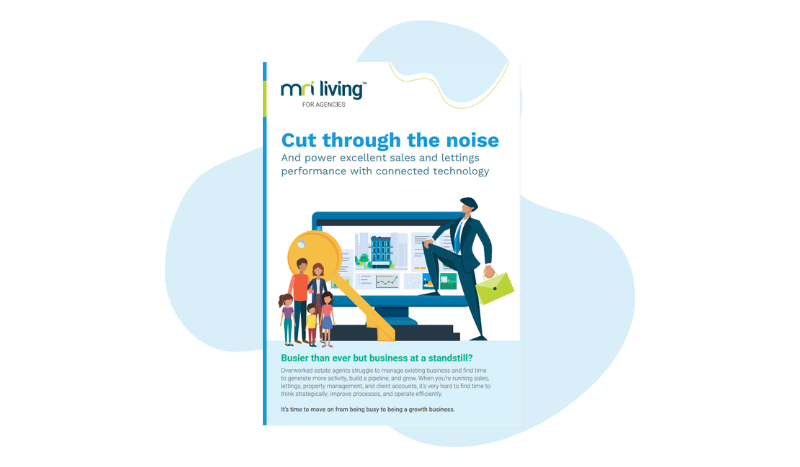1 Year of COVID-19: How have Estate Agents coped?
With March marking 1 year since the beginning of the first national lockdown across all 4 nations of Britain in response to the COVID-19 pandemic, the housing market has morphed and adapted to survive 12 months (and counting) of uncertainty.
At MRI, we’ve been working with estate agents and property software providers, developing digital solutions to improve the real estate business and streamline processes. Over the past year, I’ve been eyewitness to how the market has coped, adapted, and thrived to remote working, unprecedented activity, and a huge culture shift to digital solutions to improve their real estate business and streamline processes.
Thankfully, the government recognised the essential nature of the housing market early on. While the continuation of housing sales and support in the form of the Stamp Duty holiday has gone a long way towards keeping the industry afloat, the quick response from estate agents has also been critical in making the most of a very challenging year.
A smooth shift to remote working
When the UK was plunged into lockdown, it’s safe to say that confusion was the leading emotion for many. However, estate agents across the country achieved a speedy response to the orders for high street shops to close their doors, and for the most part adapted well to working remotely.
At MRI, we’re aware that many agents are already quite far into their digital journeys, so for many, getting to a position where in-office work could be completed from home wasn’t too difficult an undertaking. Fortunately, most CRM systems are cloud based these days, so it’s been relatively straightforward to get teams up and running.
Remote viewings – the jury’s still out
In the early stages of the pandemic, remote viewings quickly became popular. While the metrics we have access to showed a sudden drop in viewings at the very start of lockdown, virtual and remote viewings brought this number back to pre-COVID levels within just a few weeks.
Customers were surprisingly comfortable with instructing agents to put houses on the market and committing to tenancies completely remotely. While this led many to champion remote viewings as a huge success, we found that while there was a huge degree of uptake in people giving verbal intent to buy during virtual viewings, this was offset by high levels of withdrawals when they saw the property in person.
In the lettings market, the levels of actual move-in throughout this process were much higher, but the bigger commitment of buying a house seems to be a step too far. While I remain sceptical about the future of remote viewings, particularly for property sales, as a result, these did undeniably keep the momentum going in the sales market, so kudos should be given on that account.
Handling continued higher demand
The government’s Stamp Duty holiday predictably led to a huge uptick in activity. Add lowered fees to the fact that many of us have had a lot of time to notice where our homes are lacking, and suddenly estate agents, solicitors, and mortgage brokers are all scrambling to keep up with greatly increased levels of demand.
Without the Stamp Duty holiday, we’d have been seeing an inordinate amount of stalled sales, and thanks to this initiative the housing market has remained fuelled and safely afloat through a truly exceptional time.
During this period, we’ve analysed property searches carried out online, and double glazing – once the most popular search criteria for tenants seeking properties – has been replaced by outside space. This shift in desirable factors is likely going to hugely affect how agents approach selling in 2021 and beyond.
Achieving compliance and efficiency through automation
We talk at MRI a lot about how agents are faced with high levels of expectations to be liable for any failures in compliance for energy efficiency, boiler servicing and other legislation.
For many, the raft of new restrictions and legislation introduced over the past year, combined with a continued downward pressure on fees, can make dealing with this a challenge, particularly in the private rental sector, and particularly with agents simultaneously having to manage their resource levels with fewer staff in the office.
With a perfect storm of higher workloads and fewer staff, agents are rightly looking to technology to ensure that compliance standards are maintained efficiently, and we’ve been working with agents over the course of the last year to help them leverage automation and technology to this end. Whether it’s by supporting them to implement new technologies, or minimising mistakes by integrating multiple systems, there’s a huge opportunity to streamline processes and save time whilst also increasing accuracy and reducing risk.
Why the future looks bright post-COVID
Thankfully, the Stamp Duty holiday is not due to finish with a hard stop, but with a gentle phasing out. Regardless, I don’t get the impression there’ll be a lot of drop-off. Enquiries are still coming in, and agents are still busy.
With so many agents now furnished with the capability of working remotely, the question about whether many people will be returning to the office at all is ever-present. I do think there’ll be a different working environment post-COVID. Of course, there are some things that need to be done in person, but this year has proved it isn’t always necessary.
What has become clear for many agents is the true value of technology to help their teams work flexibly and remotely – and while most have done a stellar job of adapting, it’s vital that the industry keeps the momentum up and continues to streamline, automate and integrate their technology approach.
Overall, with a market transacting at the level it is right now, we seem to have survived one of the worst crises for a generation. From my vantage point at MRI, the market has been kept afloat thanks to the right support from government – and, of course, the quick, agile response of agents.
MRI Living for Agencies Brochure
Managing your existing business whilst also generating more activity and building a pipeline can leave you feeling overworked. It’s time to move from being busy to being a growth business. With comprehensive estate agency software, you can enable you…

